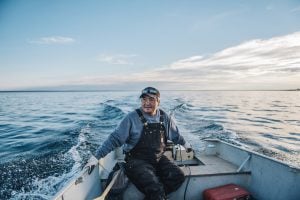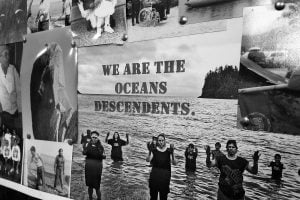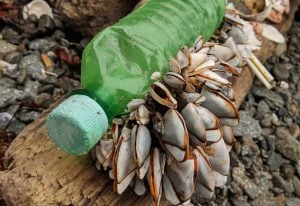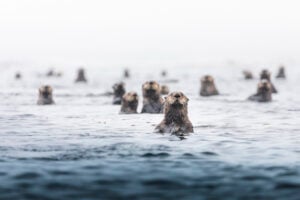
Environment
Inside the fight to protect the Arctic’s “Water Heart”
How the Sahtuto’ine Dene of Déline created the Tsá Tué Biosphere Reserve, the world’s first such UNESCO site managed by an Indigenous community
- 1693 words
- 7 minutes
This article is over 5 years old and may contain outdated information.
Environment

Haida Gwaii is often called the “Edge of the World.” It certainly felt that way as I gazed from the shoreline over the ocean to the edge of the horizon. The “Edge of the World” for me initially invoked images of a place pristine, unclaimed and unexplored: a desolate frontier. As soon as I arrived though, I started to learn that despite Haida Gwaii’s isolation and expansive wilderness, the islands were anything but untouched.
The Haida people, living in large, complex and vibrant communities, have made these islands their home for tens of thousands of years. Dozens of village sites dot the coastline, and we were fortunate to visit a few.
We took a cold, wet boat ride to K’yuusda Llnagaay. Raven-Ann Potschka generously toured us around and shared the history of the place. There were dugouts and posts for longhouses, remnants of a village once thousands strong. Mortuary poles, housing the remains of chiefs high off the ground, stood tall, despite the centuries of relentless winter storms. The moss was taking over, crawling up the poles and blanketing the ancient village site. I stood in the place where a lively community once existed, with sophisticated governments, cultural beliefs and impressive ocean-going technology. As I listened to Raven-Ann’s words, I felt as if I was travelling back in time, seeing it as it must have looked here just a few hundred years ago.
A post shared by Jay Matsushiba (@j.matsushiba) on
At the Haida Heritage Centre in Skidegate, the sounds of drums echoed between the Haida artifacts and art pieces hanging from walls and in glass cases. My friends Alex A. and Cohen were drumming and singing beautiful songs of their people, Alex in Inuktitut and Cohen in Haida. Two communities, thousands of kilometres apart, yet alike in their incredible resilience
and strength, meeting at the “Edge of the World:” the beating heart in the rhythm of the drums transcended distance and time.
Alex A. brought a giant Arctic Char into the longhouse. She had already gifted one to Barbara Wilson, a Haida Elder, and another to the Haida Watchmen. These fish were brought all the way from Pond Inlet, Alex’s hometown. We gathered around on the floor in the centre of the longhouse, as Alex showed us how to cut and prepare the char. I held and sliced through the cold fish. We cut each slice into smaller chunks and ate the fish, still raw and frozen. It tasted incredible, fresh and life-giving.
One morning, I woke up to a French lesson happening just outside my room. Chúk, another friend in the program, was leading an introductory lesson. His love for the French language was contagious and I felt that many of us were catching it too. We laughed as we told jokes in French and English. We sipped orange juice and ate our bowls of cereal as we connected to another part of our Canada.
The “Edge of the World” began to mean something different to me. Rather than a desolate, lonely island, the “Edge of the World” became a meeting place. A meeting place where the edges of my world collided with another’s. Thanks to the Ocean Bridge program, so many paths that may have never crossed were put on a collision course, changing lives forever.
The quiet “Edge of the World” became the focal point of our lives, where we soaked up experiences and gave a part of ourselves to one another. Who I am and who I will become has changed forever; my trajectory aimed towards a better future.
Are you passionate about Canadian geography?
You can support Canadian Geographic in 3 ways:

Environment
How the Sahtuto’ine Dene of Déline created the Tsá Tué Biosphere Reserve, the world’s first such UNESCO site managed by an Indigenous community

Environment
The people and landscapes of Haida Gwaii opened my eyes to the fact that we all rely on the ocean

Environment
Before joining Ocean Bridge, I was completely unaware of the extent of the problem of single-use plastic consumerism

Wildlife
As the sea otter begins its long-overdue return to Haida Gwaii, careful plans are being laid to welcome them — and to preserve a prosperous shellfish harvest